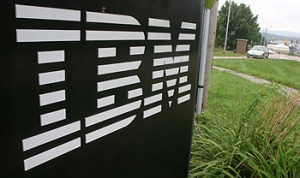Economic uncertainty grows as IBM pays $1.5 billion to leave Vermont

FEE TO FLEE: International Business Machines announced Monday it will pay $1.5 billion to offload its semiconductor business in Essex Junction.
By Bruce Parker | Vermont Watchdog
IBM became the latest company to exit Vermont as Big Blue announced Monday it will pay Abu Dhabi-owned GlobalFoundries $1.5 billion take its money-losing Essex Junction semiconductor business off its hands.
In a deal that will boost GlobalFoundries’ intellectual property portfolio and skilled workforce, IBM is relinquishing ownership of its semiconductor manufacturing facilities in Vermont and East Fishkill, N.Y. The transfer makes GlobalFoundries the largest chip-maker in the Northeast.
As part of the agreement, GlobalFoundries will be the exclusive supplier of 22 nanometer (nm), 14nm and 10nm server processor chips to IBM for 10 years.
IBM’s exit from Vermont follows a string of businesses including Kennametal, Huber & Suhner, Plasan and Energizer that left the Green Mountains for greener pastures.
While Vermonters hoped to hear of new investment in the Essex Junction plant, observers received a tidal wave of uncertainty from elected officials and business leaders.
Gov. Peter Shumlin called the acquisition “good news for Vermont” and attempted to assure workers that their jobs were secure, though he stopped short of saying the new owners were committed to capital investment in the plant.
Leaders at GlobalFoundries were even more ambiguous about the future of the plant and jobs.
“We have not made any long-term decisions about the future of these facilities,” GlobalFoundries spokesman Travis Bullard told Vermont Watchdog.
“We cannot make an open-ended commitment to no job losses at any of our facilities.”
While Bullard said the company has no plans to reduce the workforce at this time, he said decisions about facilities are based on market demands and global business conditions. He added the company would need to enhance the profitability of the business. The operation has been a significant money-loser for IBM for years.
Although GlobalFoundries has not revealed plans for Essex Junction, the company’s 2014-2015 capital expenditure plan invests heavily in New York, where the company received nearly $2 billion in tax credits and grants.
On IBM’s third-quarter earnings call Monday, Gregg Bartlett, senior vice president of technology and research and development at GlobalFoundries, told investors facilities in Essex Junction were not sufficient to meet demand for radio frequency and application-specific integrated circuit (ASIC) business, and therefore GlobalFoundries would expand to other facilities in Germany and Singapore.
UNCERTAIN FUTURE: Vermonters are anxious to know what GlobalFoundries will do with the outdated manufacturing plant in Essex Junction.
Absent from the day’s pronouncements were comments about new investment in the Vermont plant.
“I can see how people are getting edgy. I don’t hear people saying the GlobalFoundries plan is to buy this and sink $5 billion into making it a state-of-the-art center of their business model,” said Robert Letovsky, chair of the Business Administration and Accounting Department at St. Michael’s College in Colchester.
Letovsky said Vermont dropped the ball years ago with the IBM plant, driving key investment elsewhere.
“When Howard Dean was still governor, when Essex was being considered for the 300 millimeter fab, that ultimately went to Fishkill. I think there were business climate issues related to IBM’s decision to place it there. I think the conversation and impacts would have been very different had Burlington/Essex had the 300 millimeter fab — and they had the 200 millimeter.”
Arthur Woolf, associate professor of economics at the University of Vermont, said Monday’s deal reveals the true value of the manufacturing plant.
“The fact that IBM had to pay GlobalFoundries for the actual facilities says that GlobalFoundries doesn’t really want them. In order to purchase them, IBM had to give them money, and IBM wanted to do that as opposed to just getting rid of the division,” Woolf said.
He said GlobalFoundries is interested in intellectual property, and added that IBM lacked the size to produce low-cost operations to compete against the big guys.
“The only reason they want to produce chips is for their own internal use. They could more easily do that by having somebody that’s better at producing chips do it, and IBM could focus on what it does best — and what it does best is not manufacturing chips.”
The fact that IBM joins an ever-expanding list of businesses leaving Vermont raises questions about the overall business climate in the state.
“There’s two valid questions: One is to look at this deal, and the overall issue is the cost of business or business climate in Vermont,” Letovsky said.
“I could certainly see people who say, ‘Here we go again.’ … Two years hence, if there starts to be massive job cuts at this plant, and in between let’s assume Vermont doesn’t attract an IBM-sized company — which I don’t think will happen in our lifetime —people are going to say, ‘here’s another one.’”
Letovsky noted IBM was shifting to areas such as cloud computing, and he said offloading the plant was about shedding legacy assets. He added that decisions by the new owners would serve as “an interesting commentary” on Vermont’s business climate.
“In business, perception is reality. So if people perceive this is a tough place to do business, that starts to have legs,” he said.
Going forward, decisions at GlobalFoundries will also seek to align with the fast-changing nature of the technology sector.
“It’s the tech business and things can change. … So when they say jobs are secure, I mean, this is a business where there’s a lot of evolution here,” Letovsky said.
Woolf agreed that politicians can’t provide assurances about what’s next at GlobalFoundries.
“Politicians have no direct impact on whether a company is going to make any kind of announcement. The only thing politicians can do is make the underlying environment either more conducive or less conducive for business success,” he said.
Contact Bruce Parker at bparker@watchdog.org







